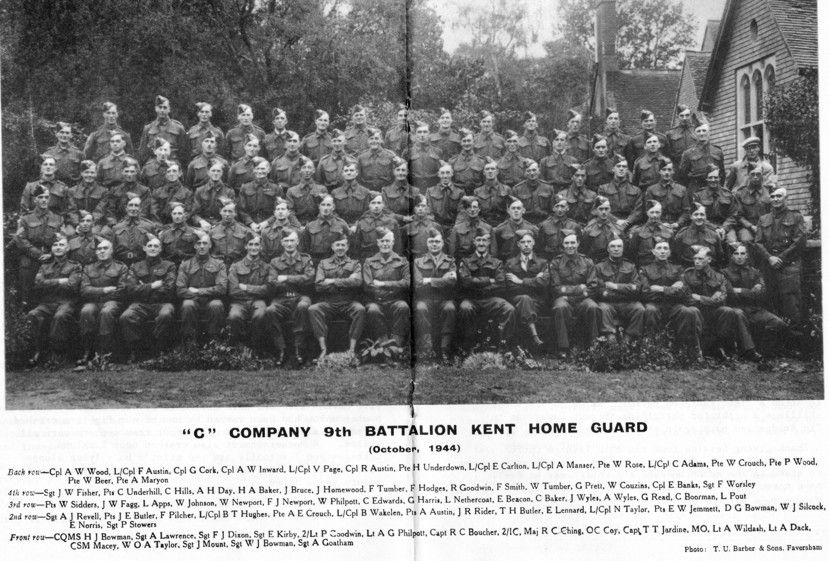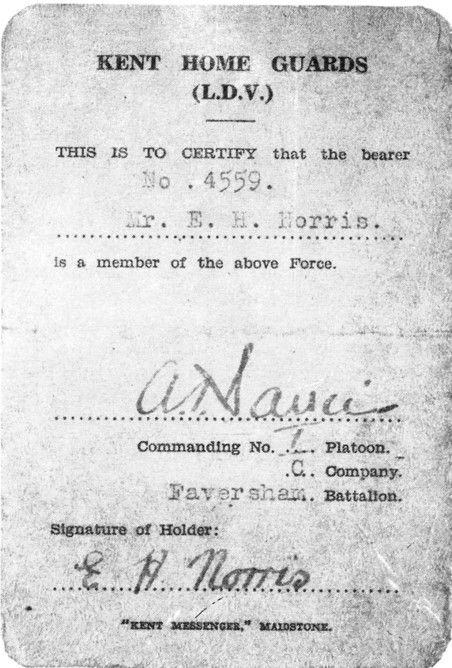World War II - Reminiscences
As everybody is now aware, it has now been 50 years since World War II was declared. (written Autumn 1989) Our Staff Reporter visited one of Teynham's oldest residents who was in the Kent Home Guard to get his reminiscences. To give a clue to the man's identity he is also known as Teynham's longest serving bell ringer. Mr. Vernon Page's memories are given below for us to share:-
"War was declared at 9 o'clock on Sunday morning the 3rd September, 1939. At 11.00 a.m. we had our first air raid earning. Nothing happened - it was possibly a reconnaissance flight! Everybody during the following week ~ that is every adult and every child over 5 years - were issued with gas masks and told to take them wherever they went. Fortunately they were never required. When the Germans invaded France, the Home Guard was formed-They were to be prepared to be called out at any time. There were three platoons of Home Guard - Teynham and Lynsted, Conyer and Norton.

One morning at 1.00 a.m. they were all called out because England was being invaded - as it was it was only a trial run. There were numerous moans and groans about that exercise!! Winston Churchill informed Hitler that Britain had an army of millions of trained men -the Home Guard - defending its shores. In reality some were only half trained, weapons were scarce and we were known generally as 'tin soldiers'. However the bluff worked! All church bell ringing was stopped except if there was going to be an invasion. In that event one church bell was to be tolled to let parishioners know the enemy was here. I was the chap nominated for this job for Teynham. Goodness knows what would have happened to me if the Germans had invaded! We suffered from bad air raids in 1941. A land mine was dropped at the back of Teynham Church blowing out all the windows of the chancel and the main window of the altar. Part of the roof was damaged too. We also had a bomb drop in Station Road which demolished the wall round Mrs. Honeyball's garden. Sandown Cottages also had a bomb dropped in the middle of them demolishing one of them completely. Fortunately no-one was killed
Hitler's bombs gave me one or two nasty scares. During the harvest period one particular year I was working around the Teynham Street area when a string of bombs dropped right across the marshes right towards me. On another occasion I was working at Stone Crossing when a bomb dropped near to The Mounted Rifleman (a pub in Luddenham now closed) demolishing several trees and damaging quite a bit of the field opposite. When working near the cemetery of Lynsted Church, the Church was hit by a bomb with a lot of damage to the tower.
On another occasion, this time when I was ploughing, I saw several soldiers who were stationed at Lynsted running for dear life. This was the only indication I had of danger as I could not hear the air raid warning over the tractor's noise. I jumped off the tractor, having stopped it, of course, and hid by the side to see a bomb drop about 100 yards in front of me in the next orchard. When the flying bombs came across later on in the war, one landed on Mr. French's hop garden' demolishing a quarter of it. I should have been working there but for various reasons I had been delayed.
When I was the tallyman in 1941 for the hop pickers, one of my jobs was to warn people when they heard an air raid warning 'to keep under the vines'. I need not have bothered because when the air raid warnings were heard everyone stopped work, and went out into the open to see what was going on. The odd one or two did put the old tin baths over their heads for protection!!
Five German air crew were buried in Teynham Churchyard. A bomber which had been rammed by one of our fighters crashed in an orchard at Buckland. The four crew members were all killed. A Messerschmitt also crashed near Buckland Cottages and I actually saw the pilot's body lying along-side the fence. All the bodies were exhumed approximately twenty years later.
Quite a few people who wanted them erected iron air raid shelters in their homes. Outdoor shelters were sited at. the Old School, Mr. French's farmyard and at Barrow Green. The one at the school was mostly used and If the raids were particularly bad most families left their home shelters to use the outdoor ones.
Lord Haw Haw (William Joyce) lodged in Coastguard Cottages, Conyer before the war. He regularly attended dances in the old St. Mary's Hall and I thought at the time he was a nice chap'. He left England when war was declared. I will always remember one of his broadcasts from Germany. It was on an Easter Sunday night and his words were something like: "Germany calling, Germany calling - Conyer we shall be coming over" They came over about. half an hour afterwards! After the war. Lord Haw Haw, having been tried in France, was executed.
Fire watching schemes were in operation during the war (something similar to Neighbourhood Watch nowadays). Neighbours got together to make up a rota for fire watching. The shifts were 1.0 p.m. to 2.00 a.m. and 2.00 a.m. t o 6.00 a.m. Luckily we were not: worked too hard and l was only rarely that one could not wake up the neighbour who was meant to relieve you! Another feature of the war was the long range guns firing from France, the shrapnel from which either landed in Dover or Folkestone. Towards the latter part. of the war one or other of our platoons of Home Guard had to go to Faversham Drill Hall to spend a night there on patrol. We were paid three shillings a night for patrolling through Faversham to Tin Bridge and back again throughout the night.
A Thanksgiving Service took place in Teynham Church just after the war. The Church was packed. People were Having to stand in the porch because the Church was so full. I have never seen. this before or since.'
Vernon Page
 Our thanks are extended to Mr. Vernon Page for sharing his memories with us, to Mr. Cecil Beacon for loaning us the photographs and to Mr. E. Norris for the loan of his Kent Home Guard Identity Card shown here.
Our thanks are extended to Mr. Vernon Page for sharing his memories with us, to Mr. Cecil Beacon for loaning us the photographs and to Mr. E. Norris for the loan of his Kent Home Guard Identity Card shown here.